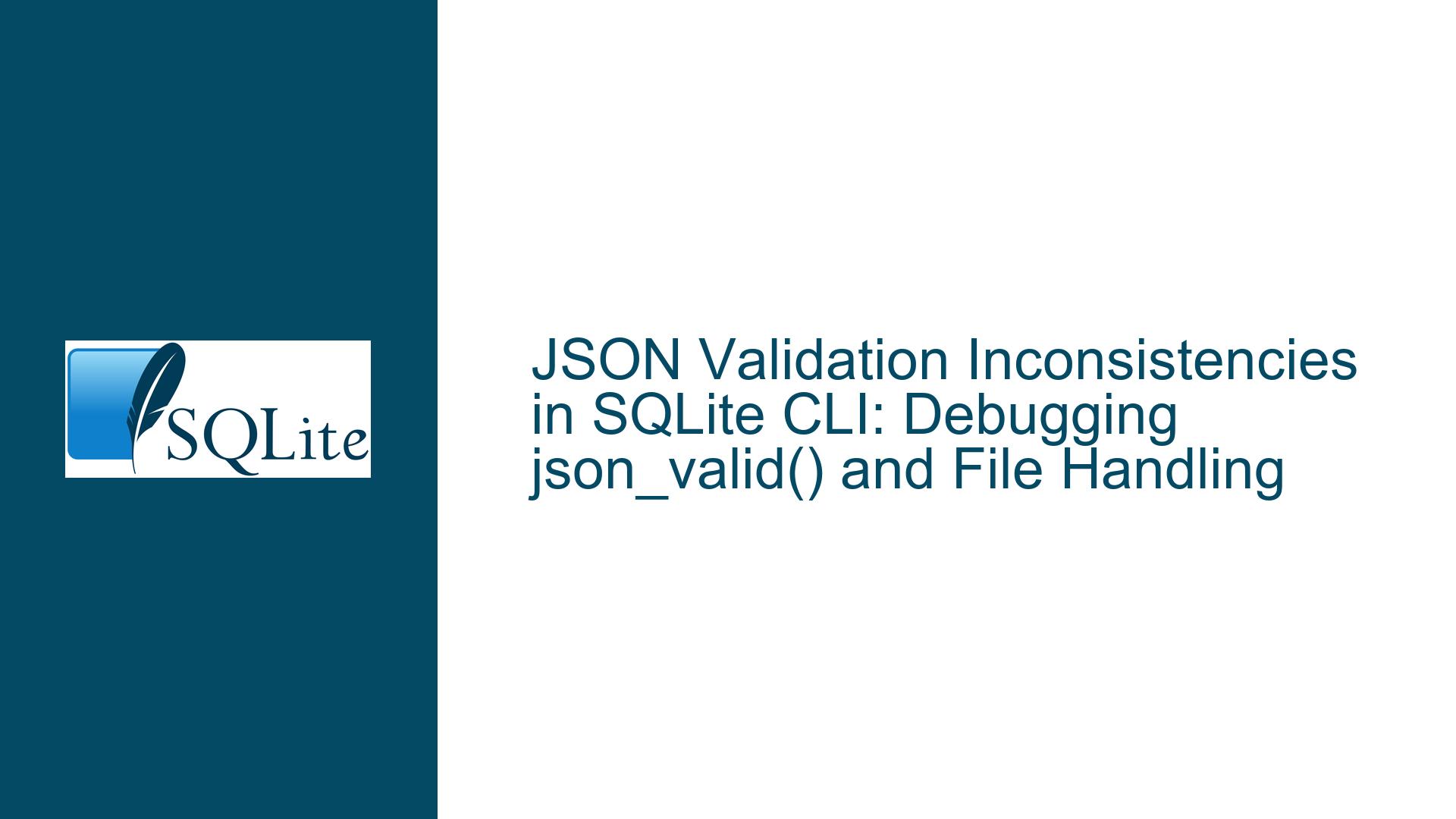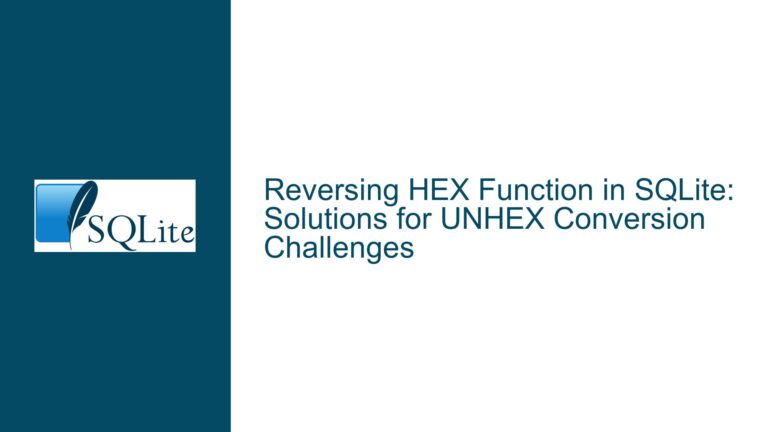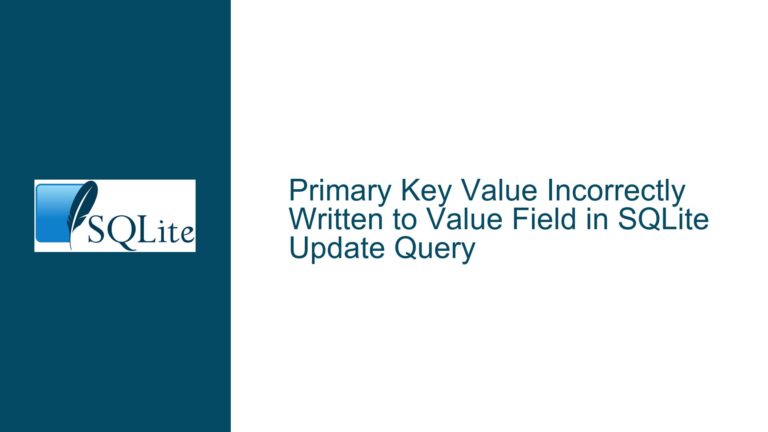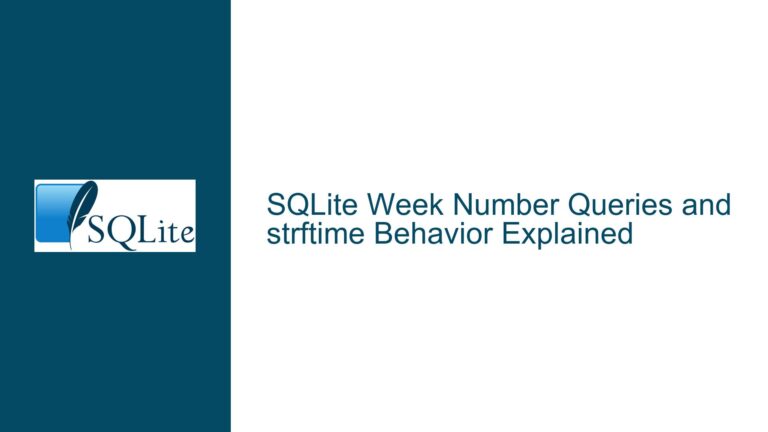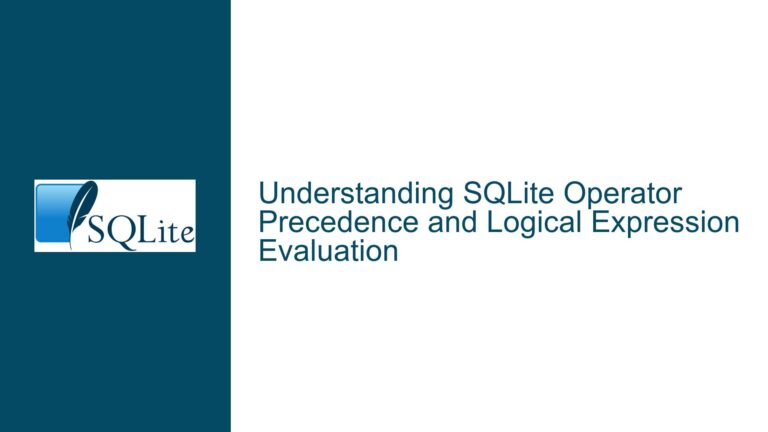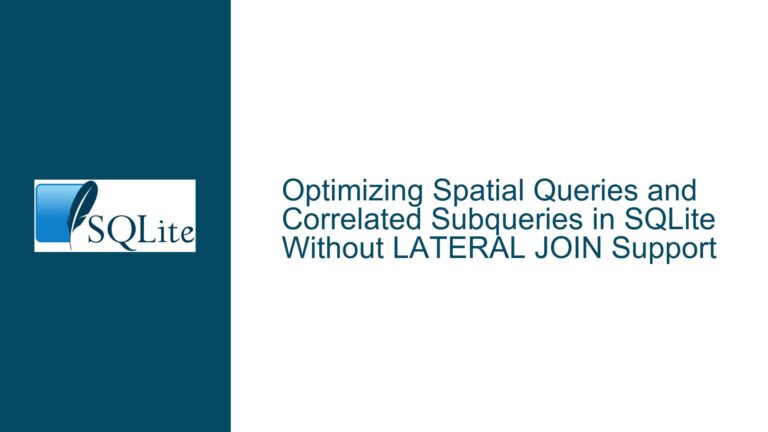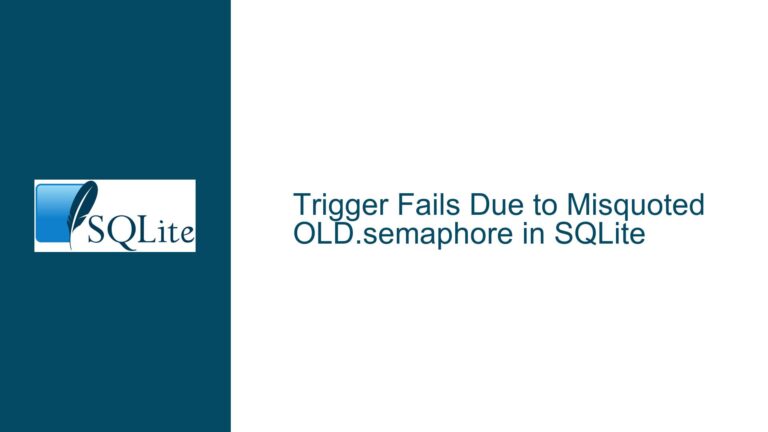JSON Validation Inconsistencies in SQLite CLI: Debugging json_valid() and File Handling
Issue Overview: JSON Validation Inconsistencies in SQLite CLI
The core issue revolves around inconsistent behavior when using SQLite’s JSON functions, specifically json_valid(), to validate JSON files. The user reports that json_valid() sometimes returns no value or inconsistent results when validating JSON files, even when the files remain unchanged. Additionally, the json_error_position() function, which is designed to identify the position of errors in invalid JSON, returns 0 for files that are seemingly valid, while throwing a runtime error for explicitly invalid JSON files. This behavior raises questions about the reliability of JSON validation in SQLite, particularly when using the 32-bit CLI version.
The user provides a series of SQLite CLI commands to demonstrate the issue. For instance, json_valid(json(readfile('test_zerts.json'))) returns 1 (indicating valid JSON), while json_valid(json(readfile('invalid.json'))) throws a runtime error. However, the behavior becomes inconsistent when the same file is validated multiple times or when the CLI environment is reset using .open :memory:. The user also notes that they are using SQLite version 3.43.2, a 32-bit build, which may be contributing to the issue.
This inconsistency is problematic for developers relying on SQLite’s JSON functions for data validation, as it undermines trust in the results. The issue is further complicated by the user’s use of the readfile() function, which reads the file content into SQLite for processing. If readfile() introduces any unintended side effects, such as encoding issues or file handle mismanagement, it could explain the erratic behavior of json_valid().
Possible Causes: File Handling, Encoding, and Version-Specific Bugs
The inconsistent behavior of json_valid() and related JSON functions in SQLite can stem from several underlying causes. Below, we explore the most likely culprits:
File Handling Issues with
readfile()
Thereadfile()function is used to load the contents of a file into SQLite for processing. Ifreadfile()does not handle file encoding, line endings, or file locks correctly, it could introduce inconsistencies in the JSON data being validated. For example, ifreadfile()reads a file with UTF-16 encoding but fails to decode it properly, the resulting string may be malformed, causingjson_valid()to fail unpredictably. Additionally, if the file handle is not properly closed after reading, subsequent reads of the same file might yield inconsistent results.Encoding and Character Set Mismatches
JSON validation is highly sensitive to encoding issues. If the JSON file contains non-ASCII characters or uses an encoding that SQLite does not handle natively,json_valid()might misinterpret the data. For instance, a JSON file encoded in UTF-8 with BOM (Byte Order Mark) might be read incorrectly byreadfile(), leading to validation errors. Similarly, hidden characters such as null bytes or non-printable control characters could causejson_valid()to return inconsistent results.Version-Specific Bugs in SQLite 3.43.2
The user is using SQLite version 3.43.2, a 32-bit build. While this version is generally stable, it is possible that it contains bugs specific to JSON handling or file operations. For example, thejson_valid()function might have edge cases that were not thoroughly tested in this version, leading to inconsistent behavior. Additionally, the 32-bit build might have limitations in memory handling or file I/O that do not exist in the 64-bit version, exacerbating the issue.Unintended Side Effects of Invalid JSON
The user mentions that validating an invalid JSON file might cause unintended side effects. For example, ifjson_valid()encounters an invalid JSON file, it might leave the internal JSON parser in an inconsistent state, affecting subsequent validations. This could explain whyjson_valid()sometimes returns no value or inconsistent results when validating the same file multiple times.Environment Reset with
.open :memory:
The user attempts to reset the SQLite environment using.open :memory:, which creates a new in-memory database. However, this does not necessarily reset the state of the JSON parser or clear any cached file handles. If the issue is related to internal state or caching, resetting the environment might not resolve the problem.
Troubleshooting Steps, Solutions & Fixes: Resolving JSON Validation Inconsistencies
To address the inconsistent behavior of json_valid() and related JSON functions in SQLite, follow these detailed troubleshooting steps and solutions:
Verify File Encoding and Content
Ensure that the JSON files being validated are encoded in UTF-8 without BOM, as this is the most widely supported encoding for JSON. Use a text editor or hex viewer to inspect the files for hidden characters, such as null bytes or non-printable control characters. If the files contain non-ASCII characters, confirm that they are properly encoded and do not introduce any unintended artifacts.Test with Explicit JSON Strings
Instead of usingreadfile(), test thejson_valid()function with explicit JSON strings to isolate the issue. For example:SELECT json_valid('{"this":"is","a":["test"]}');If the function behaves consistently with explicit strings, the issue is likely related to file handling rather than JSON validation itself.
Upgrade to the Latest 64-Bit Version of SQLite
The user is using a 32-bit build of SQLite 3.43.2. Upgrade to the latest 64-bit version of SQLite, as it may include bug fixes and performance improvements related to JSON handling and file operations. Verify the behavior ofjson_valid()in the new version to determine if the issue persists.Check for File Handle Leaks
Ifreadfile()is not properly closing file handles, it could lead to inconsistent behavior. Monitor the system’s file handle usage while running the SQLite CLI commands to detect any leaks. If leaks are detected, consider implementing a workaround, such as reading the file content in an external script and passing it to SQLite as a string.Use Alternative JSON Validation Methods
Ifjson_valid()continues to behave inconsistently, consider using alternative methods to validate JSON data. For example, you can use a programming language like Python to validate the JSON files before processing them in SQLite:import json def validate_json(file_path): try: with open(file_path, 'r', encoding='utf-8') as f: json.load(f) return True except json.JSONDecodeError: return FalseInspect SQLite’s Internal State
If the issue is related to the internal state of the JSON parser, inspect the state using debugging tools or custom logging. For example, you can log the output ofjson_error_position()and other JSON functions to identify patterns or anomalies in the validation process.Report the Issue to the SQLite Development Team
If the issue cannot be resolved through troubleshooting, consider reporting it to the SQLite development team. Provide a detailed description of the problem, including the SQLite version, operating system, and steps to reproduce the issue. Include sample JSON files and SQLite CLI commands to help the team diagnose the problem.Implement a Fallback Mechanism
To mitigate the impact of inconsistent JSON validation, implement a fallback mechanism in your application. For example, ifjson_valid()returns no value or an unexpected result, retry the validation or use an alternative validation method. This approach ensures that your application remains functional even if the underlying issue cannot be immediately resolved.
By following these steps, you can systematically identify and resolve the root cause of the JSON validation inconsistencies in SQLite. Whether the issue stems from file handling, encoding, version-specific bugs, or unintended side effects, a thorough and methodical approach will help you achieve reliable and consistent JSON validation in your SQLite environment.
